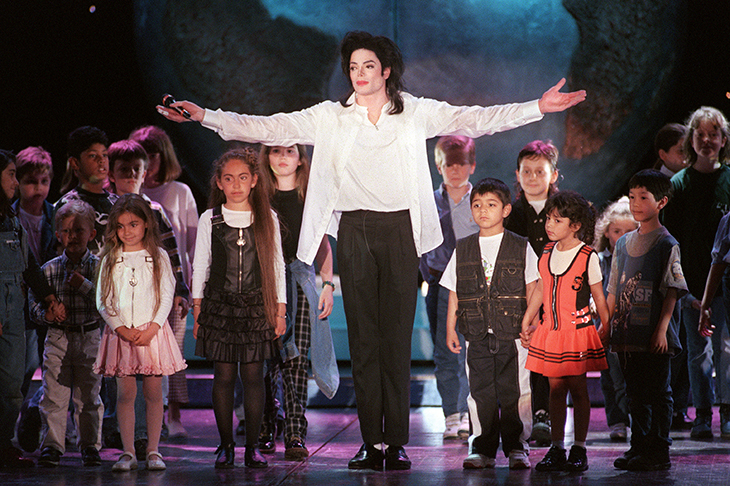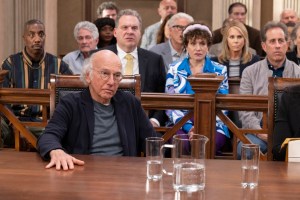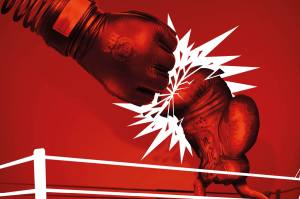‘The innocence of America is one of its oldest traditions,’ said Oscar Wilde who, like Michael Jackson, was accused of seducing underage boys. Wilde was convicted, and cast into a disgrace that everyone now agrees was a crime against art and morality. Jackson was able to wriggle out of court, more than once. He had money and he had lawyers but, most of all, he had the entertainment business on his side, moralizing to us that he was a great artist.
The pagan cult of show business is the real American religion, and the innocence of children is one of its most lucrative assets. The innocence of Michael Jackson, child star turned child abuser, was an article of faith because Jackson could fill a stadium. If you substitute a money-spinning pagan cult for the moral center of your society, don’t be surprised that there are parents willing to sacrifice their children to it. Or that entire industries were willing to cover for him, and tell us that their receipts proved that this twitching, squeaking creep was an artist, and therefore bound to be misunderstood by mere mortals who asked why, if Jackson was innocent, he and his family paid $25 million in 1994 to stop Jordy Chandler’s parents from taking him to court.
The only amusing aspect of HBO’s unremittingly disturbing and plausible Leaving Neverland is the Jackson estate’s efforts to stifle its transmission. On Sunday and Monday nights, the estate released films of Jackson in concert for free on YouTube. The timing and duration of these spoilers overlapped exactly with HBO’s broadcast of its two-episode documentary. The estate’s lawyers are also threatening to sue HBO for $100 million. Not for libel — you can’t libel the dead — but for breaching a clause in a 1992 contract in which HBO, in order to obtain the rights to broadcast a Jackson concert, committed not to defame him.
‘Michael would like it if you bent over and spread open your cheeks,’ recalled James Safechuck, who was 10 years old at the time. ‘That’s what he liked. And then he would masturbate.’
Wade Robson did the same for Jackson when he was seven years old, and says that Jackson had him performing oral sex at the same age. Having endured the full four hours of Leaving Neverland, I have no doubt that Safechuck and Robson are telling the truth. The pattern of behavior that the two men describe is the banal and evil work of the serial predator: co-opting the parents, isolating the child, establishing routines of sexual ‘play’ that have to be kept secret, and a slow descent into the worst kind of exploitation.
Macaulay Culkin, another playmate who was home alone with Jackson, says the singer never touched him. He probably didn’t, because Culkin was himself protected, albeit in the grossly negligent way of showbiz. Safechuck was a glorified child extra who had danced in a Jackson video. Robson was a Jackson impersonator who had mastered his idol’s sexlessly pornographic dance moves as a five-year-old. They were two in the army of would-be child stars — usable and touchable, as expendable as Robson’s underwear, which had blood in it after Jackson tried to anally rape him. But Culkin was money. Jackson, as his song said, was a ‘Smooth Criminal’.
If Jackson had been mildly affluent and otherwise anonymous, the Jordy Chandler case would have gone to court. Nor would Robson and Safechuck have been pressured to testify as witnesses to Jackson’s character when another victim, Gavin Arvizo, took Jackson to court in 2005. Instead, the Jackson family business used its money and connections to slander the accusers. And with the admirable exception of Oprah Winfrey, the great and corrupt lined up as character witnesses, both in and outside of the courtroom. Some of them had the nerve to imply that Jackson was the victim of racism, contrary to Jackson’s strict instructions that, ‘It don’t matter if you’re black or white’.
The wishlist of Jackson’s character witnesses in the 2005 trial is unique in the annals of witness intimidation. His lawyers sought to leverage the godlike status of the entire entertainment business against Gavin Arvizo: Elizabeth Taylor, Quincy Jones, Stevie Wonder, Diana Ross, Jay Leno, Larry King, Kobe Bryant, Deepak Chopra, and another 350 famous and influential names. Perhaps they might tell us what they think of Jackson now. The same goes for Beyoncé and Jennifer Aniston, two among the many stars who collaborated in what looks like a blatant attempt to pre-empt the Arvizo trial, the 2004 CBS special Michael Jackson Number Ones.
It’s easy to blame the parents of Jackson’s victims. With the exception of Wade Robson’s father, who lost his children because he opposed his wife’s determination to use Jackson to further Wade’s career, they should be blamed. In their greed and negligence, they were willing to pimp their children for fame. Worthier targets, though, are the celebrities who abetted Jackson by attesting to his innocence, and the business that enables people like Jackson, R. Kelly and Harvey Weinstein by throwing a gilded blanket of glamor around them. But to get to the source of the evil, you have to follow the money — all the way to our wallets.
It’s the ticket-buyers and star-worshippers who sustain the whole rotten business. An army of suckers and sentimentalists paid for Jackson’s fantasy kingdom at Neverland, the cash and gifts he gave to his victims, and the lawyers who cleaned up the mess. This morning, people are agonizing on Twitter about whether they can still enjoy Jackson’s music with a clean conscience. How they managed that in the first place is beyond me. Call it the innocence of America.
Dominic Green is Life & Arts Editor of Spectator USA.


















